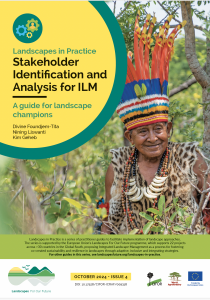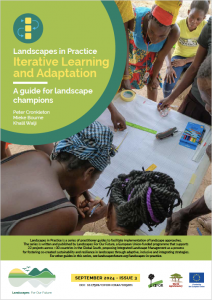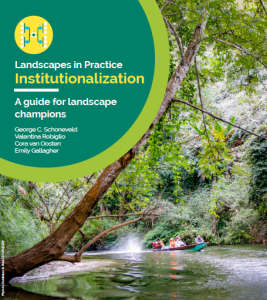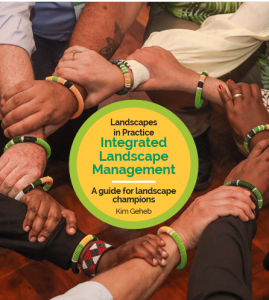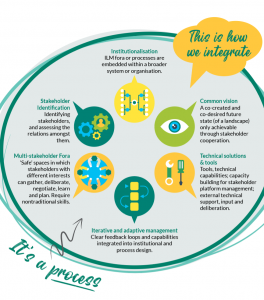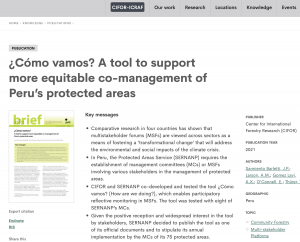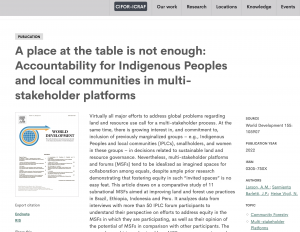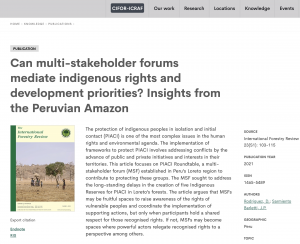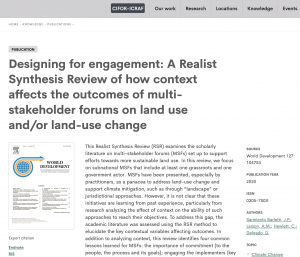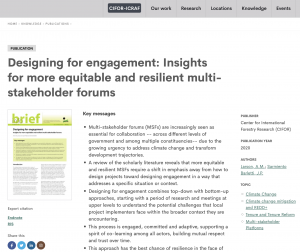Category: Publications and papers
Landscapes in Practice: Stakeholder Identification and Analysis
Landscape condition and sustainability depends on what its stakeholders are doing. ILM practitioners cannot, therefore, avoid considering stakeholder activities. This Landscapes in Practice paper provides an overview of the key concepts and the tools and resources available for learning more.
Landscapes in Practice: Iterative learning and adaptation
Integrated Landscape Management (ILM) entails dealing with complexity and uncertainty, of which the interests of diverse stakeholders are an important part. Management strategies such as Adaptive Management and Collaborative Management have emerged to address these challenges and have been operationalized as an approach called Adaptive Collaborative Management (ACM).
Landscapes in Practice: Institutionalization
Landscapes in Practice is a new series of practitioner guides to facilitate implementation of the six core dimensions of lntegrated Landscape Management (ILM). This paper discusses the importance of institutionalization and provides an eight-step strategy to achieving it.
Landscapes in Practice: our ILM overview
Landscapes in Practice is a new series of practitioner guides to facilitate implementation of the six core dimensions of lntegrated Landscape Management (ILM). In this introductory brief, we provide an overview of what ILM is – in particular, how we have approached the concept – and the reasons why it is needed.
Landscapes in Practice: Our guides for landscape champions
The Central Component is tasked with synthesizing and disseminating knowledge and lessons from Landscapes For Our Future's 22 projects. Our new series of practitioner guides aims to do just that in order to facilitate implementation of what we propose are the six core dimensions or elements of landscape approaches.
¿Cómo vamos? A tool to support more equitable co-management of Peru’s protected areas
This brief presents the findings of an assessment conducted in Peru to understand and verify the adoption, outcomes, and potential impacts of the participatory reflective monitoring tool called "¿Cómo vamos?" (How are we doing?) in multistakeholder forums (MSFs). MSFs are recognized as a means of fostering transformative change to address the environmental and social impacts of the climate crisis. In Peru, the Protected Areas Service (SERNANP) mandates the establishment of MSFs or management committees (MCs) involving various stakeholders in the management of protected areas. The tool was co-developed and tested by CIFOR and SERNANP with eight MCs. The positive reception and interest in the tool led SERNANP to publish it as an official document and require its annual implementation by the MCs of its 75 protected areas. This assessment provides insights into the adoption, outcomes, and potential impacts of the tool in Peru.
A place at the table is not enough: Accountability for Indigenous Peoples and local communities in multi-stakeholder platforms
This article explores the challenges of achieving equity in multi-stakeholder platforms and forums (MSFs) focused on sustainable land and resource governance. Drawing on a comparative study of 11 subnational MSFs in Brazil, Ethiopia, Indonesia, and Peru, the article examines the perspectives of Indigenous Peoples and local communities (IPLCs) who participate in these forums. The research aims to understand how MSFs can ensure voice, empowerment, and address inequality, while being accountable to the needs and interests of IPLCs. The findings highlight the optimism of IPLC participants but also reveal accountability failures. The article argues for greater strategic attention to how marginalized groups perceive their participation in MSFs and proposes ways to foster collective action and hold more powerful actors accountable to achieve equality, empowerment, and justice.
Can multi-stakeholder forums mediate indigenous rights and development priorities? Insights from the Peruvian Amazon
This article examines the role of a multi-stakeholder forum (MSF) called PIACI Roundtable in protecting indigenous peoples in isolation and initial contact (PIACI) in Peru's Loreto region. The MSF aimed to address delays in establishing Indigenous Reserves for PIACI. The article highlights the potential of MSFs to raise awareness and coordinate actions for vulnerable groups, but emphasizes the importance of shared respect for recognized rights among participants. Without such respect, MSFs may prioritize other perspectives over the rights of marginalized communities.
Designing for engagement: A Realist Synthesis Review of how context affects the outcomes of multi-stakeholder forums on land use and/or land-use change
This Realist Synthesis Review analyses scholarly literature on multi-stakeholder forums (MSFs) for sustainable land use. It focusses on subnational MSFs involving grassroots and government actors. The review highlights key contextual variables and identifies four common lessons: commitment, engagement of implementers, openness to stakeholders, and adaptive design. Successful MSFs are recognized as part of a transformative process, involve research and meetings, build consensus and commitment, and prioritize adaptive learning. The central lesson is to design for engagement that addresses the context for greater success.
Designing for engagement: Insights for more equitable and resilient multi-stakeholder forums
A process that is engaged, committed and adaptive allows for all actors to build trust, and thus has the best chance of success moving forward. This literature review highlights the importance of engagement within an MSF.


